Oh dear god!!! It's SHROOoo00oOMSDAY!! And I just found a LOT of Morels!
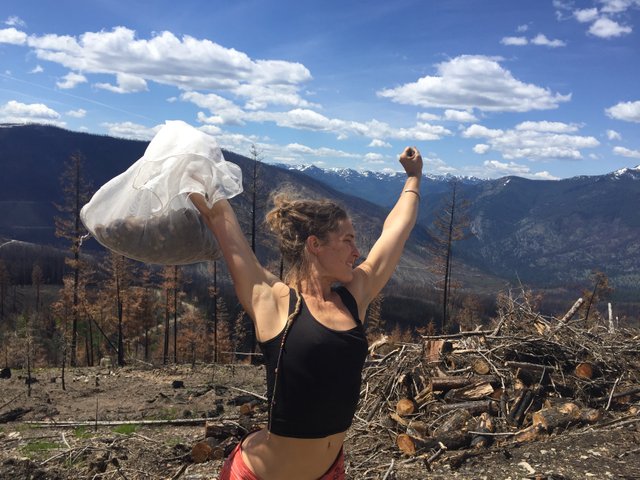
guess whats in the bag?!?!
Music to read by --this post was meant to be read with music, click to play! --> Spotify or Youtube
Man has only a thin layer of soil between himself and starvation.
-the Cincinnati Bard
Soil
from Proto-Indo-European Sul, meaning "thick liquid"
Soils are the history books of the world written by insects, microbes, and fungi. Our topsoil holds over twice the biomass of all of earth's animals combined. Soil cannot be created in a lab, nor should it be seen as the sum of it's components, Indeed, the vast majority of soil organisms cannot be intentionally cultivated, their lives being inextricable from the soil body itself. The habitat of these microbes--the inanimate aspect of the soil web--is ancient, being born over eons by the slow reduction of organic matter to small substances, collectively known as humus. Humus takes such a long time to accumulate that it may only reach a depth of one meter in a very old growth forest, while it is often less than an inch or two in more developed areas. With such a small amount of topsoil on the planet, this protective layer of the Earth must be spoken for, understood, and held sacred by all those who care for the wild. It is the skin of the world, tattooed with the legacies of it's inhabitants. But just as our skin can be easily wounded, so too is the soil readily broken and scarred. To talk of any ecology or it's protection is to speak of soil, so precious is it's connection to the web of life.
-Peter McCoy in Radical Mycology
I have expensive tastes. I like fresh fish flown in from coastal ports. I enjoy fine wine, beer, and whiskey. I like me a good hunk of animal(especially a heart or liver). Lucky for me, my home here in Montana is rich in quality meat. We typically have venison, elk, well raised pigs, grass fed beef, and backyard chickens in our freezer.
I get about 5 gallons of absolutely incredible fresh milk from our neighbor every week, that gets turned into delicious cheeses, yogurt, and kefir. In short, I'm damned lucky. Montana is the kind of place where not a lot of folks have much money, but if you're careful, you can still eat really well. We just built a third hoophouse last fall, and now it's overflowing with spinach, radishes, kale, bok choy, chard, six different kinds of lettuce, beets, cilantro, turnips, corn, squash, basil, thyme, rosemary, ginger, potatoes, tomatoes, turmeric, garlic, onions, and a bevy of hot pepper plants.
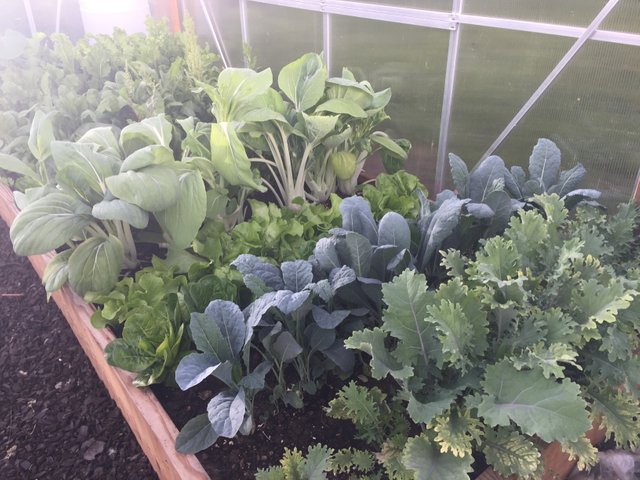
It's truly an overwhelming bounty of fresh, healthy, and hearty food. But this post isn't actually about any of that. As a native Montanan, I also grew up with a taste for a little black mushroom with a big reputation.
Morels.
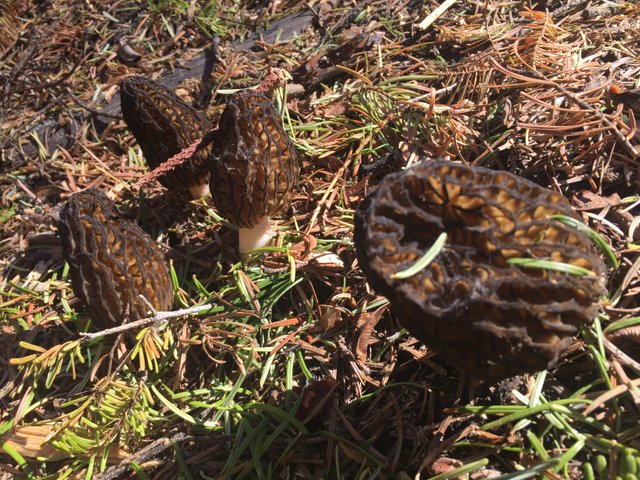
That is what this post is (mostly) about. Most of my posts are going to be mostly about something :P As a young chitlan, I learned to identify morels from the adults around me. Their excitement, and adoration of these intrepid little black beasts was palpable. Just like money, I always liked money too, in part I suppose because I saw how important it was to adults, and how much power they bestowed on it.
But Morels, not only did I dream about stumbling across a patch of them all by myself, but I constantly looked for them...there was some magical allure to finding them in The Wild! A valuable and exciting thing that just pops out of Nowhere :P
There are many names for Morels. Dryland fish, or hickory chickens in Kentucky, merkels or miracles. In parts of West Virginia, they call them molly moochers, or muggins. Some people just call them sponges. In Appalachia, you might here them called haystacks, or snakeheads. In various ancient dialects of german, you might here them called Murho, Mork, Morhilo, Morhela, Morha, Moraha...which means root, carrot, tuber, mushroom, tree-root, or plant-root.
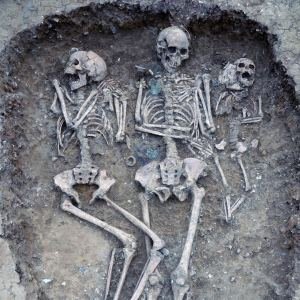
It's those last two that really strike my curiosity. Morha and Moraha come from a dialect of Old High German that was actively spoken around 700 to 1000 ad. Thats those folks up above. Again, meaning tree-root, or plant-root. That's kinda weird? Have you ever heard of the term..."Mycorrhizal Fungi"? Maybe yes, maybe no? Lets look it up! Wikipedia says
A mycorrhiza (Greek: μυκός, mykós, "fungus", and ρίζα, riza, "root",[1] pl. mycorrhizae or mycorrhizas) is a symbiotic association between a fungus and the roots of a vascular host plant.[2] The term mycorrhiza refers to the role of the fungi in the plants' rhizosphere, its root system. Mycorrhizae play important roles in soil biology and soil chemistry.
Especially curious when you consider that science credits the discovery of mycorrhizal fungi to a german botanist named Albert Frank in 1885. Albert was commissioned by the king of Prussia(Wilhelm the 1st) to develop practical methods for truffle propagation. It didn't work out, and it largely still hasn't.
I love etymologies, it's like getting a little glimpse of how people once thought, and sometimes a bit of perspective on your own consciousness =) Anyway, we started with Morels, but even the NAME Morel brings up some good questions. Why would they be called plant roots? Lets take a quick look at what Peter McCoy has to say about Mycorrhizals in Radical Mycology, a book published hardly a year ago in 2016.

Mycorrhizal Fungi
Mycorrhizal Fungi are fungus that engage in a mutually beneficial relationship with living plant roots, by entangling their hyphae(we'll get to it, just a sec!) with delicate root hairs, these fungi form a mycorrhizal symbiosis, a fungus-plant dynamic that is shared by more than 6,000 fungal species and at least 90% of the worlds plants. These fungi are found in all habitats and latitudes on earth. In fact, where wild soils remain intact, a single gram of soil may contain a mile or more of fungal hyphae.
But what is a hyphae?!?
Wikipedia says...
A hypha (plural hyphae, from Greek ὑφή, huphḗ, “web”) is a long, branching filamentous structure of a fungus. In most fungi, hyphae are the main mode of vegetative growth, and are collectively called a mycelium.
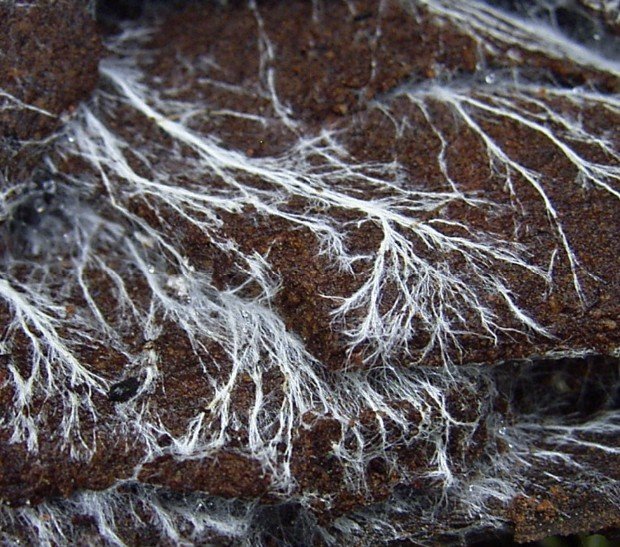
the original blockchain
So basically those little mushroom tendrils. Great! Lets jump in a bit deeper...(back to Peter McCoy, with some minor editing for simplicity)
A single acre in an aged Douglas-Fir stand contains around 3,700 pounds of mycelium by dry weight, and 4,800 pounds of mycorrhizal rootlets. This ubiquity results in a wide range of benefits to not only the organisms involved, but also to the entire ecosystem in which they are enmeshed.
In all mycorrhizal structures, nutrients are passed between partners. The mycorrhiza is like a barter station where each species provides something of value that the other could not obtain on its own. With its ability to photosynthesize, the plant reaches toward the sun and creates sugars that it sends down to the fungus. In return, the slim and quick-growing hyphae extend far into the soil matrix to draw in water, nitrogen, phosphorus, and other nutrients that the thick and slow growing root hairs would not be able to reach on their own. In effect, the fungus expands the absorptive area of the plant roots 10-1,000 fold, thereby increasing the growth rate and vitality of the plant. The benefits of this enhanced nutrient access include a higher nutritional content, medicinal quality, and flowering rate in mycorrhizal plats when compared to non-mycorrhizal plants of the same nursery stock. (there's a fantastic Radiolab podcast about this!!!)
This increase in absorptive surface area is not the only way that these fungi enhance nutrient access. If it were, plants would likely have evolved to produce longer or slimmer roots long ago. Fungi produce a unique array of digestive enzymes and acids that are able to unlock nutrients that would otherwise be unavailable to plants. These nutrients may come from organic (carbon-containing) substances, such as rock or clay. Through their digestive abilities, these fungi transform nutrients to a water-soluble, and thus "available" form that plants can readily take up into their tissue and metabolize. The fungi transmute inert substances into nourishment, channel these compounds through their mycelial networks across the soil, and provide them to whole plant communities and ultimately to the entire ecosystems that the plants inhabit. And when these plants die, they are churned back into the soil matrix by decomposing fungi where their nutrients eventually pass on to other organisms.
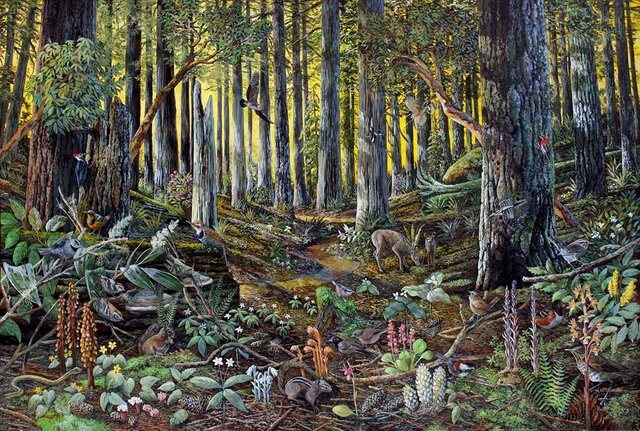
Mycorrhizal Fungi perform a range of metabolically taxing acts that do little to serve themselves in the short- or long-term. They are central drivers in the cycling of the world's nutrients, they are the micro bridges that sustain whole plant communities and enable life to flourish in some of the most extreme environments of Earth. In forests, fields, and deserts, mycorrhizal fungi act as keystone species that stitch together the fabric of a habitat and pull it forward through time. Without them, life as we know it would not exist on Earth. They are the keepers of the wild and the protectors of our biomes, constantly balancing an ecosystems plant, animal, and microbial communities to assist in its spiraling succession through every climax extreme and complementary lull of blight. It is to these hidden fungi that we are the most deeply indebted.
-Peter McCoy in Radical Mycology
WOW! Okay. So basically, Mycorrhizal fungus ties everything together and provides a framework for nutrient access, and distribution in a totally decentralized fashions across vast distances. Interesting. So back to Morels.
Obviously people have known about them for quite some time. Morels happen to belong to a group of fungus called the Ascomycota. Ascomycetes (what we call members of Ascomycota) make up a very large phylum of the fungi queendom. Ascomycota has provided us with some incredible allies over the years, as well as some just plain creepy ass shit.
- Penicillium mould (cheese and antibiotics) is an Ascomycete
- Saccharomyces cerevisiae (bread and beer), and actually all yeasts are just Ascomycete Fungus of some sort.
- Aspergillus (Soy sauce, Miso, Sake)
Some Ascomycete's have been successfully bred to eat plastic.
Other Ascomycota prefer to hunt more lively prey. (WATCH THIS!!! It's intense creepy-like, we just need to find one that does this to fucking mosquitos)
But wait...Why are Morels so expensive?
How expensive is expensive? You can order a dry lb from amazon for just $170 (cheap isn't it?). Morels are expensive for two reasons, first, lots of people think they are DELICIOUS...and two, no-one has managed to cultivate them well on a commercial scale. So any Morels you buy have been picked by hand, often by people quite far out in the "backcountry", braving storms, wildlife, bugs, and generally rough conditions, and THEN must be hauled back to civilization and quickly refrigerated so they can be shipped to restaurants all around the world. If that wasn't enough, the high prices of quality mushrooms means that some 'professional pickers' get a mite touchy about 'their' patches. It's not uncommon in some areas for a few people a year to end up murdered for stumbling across the wrong patch of mushrooms.
After a lifetime of staring at my feet while hiking, it finally paid off!!! Sydney and I went out with some friends last week on my day off, and ooohh boy!!! We're feeling pretty mushroom rich right now. In coming back home, I just get this feeling of nutty brown satisfaction every time I look at our bag of dried morels.
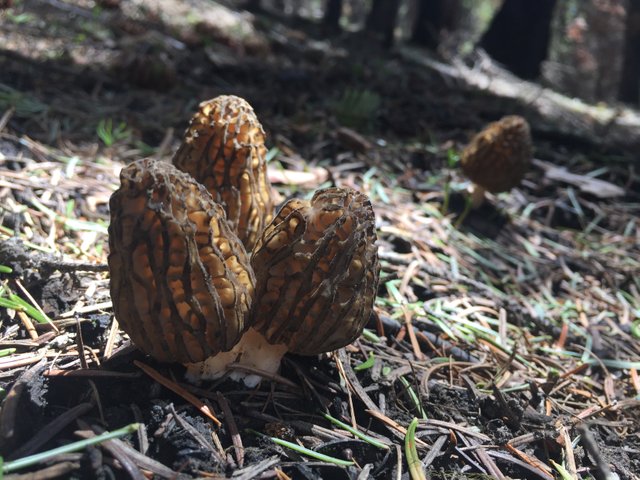
first there were just a couple...but before we knew it, they were everywhere!
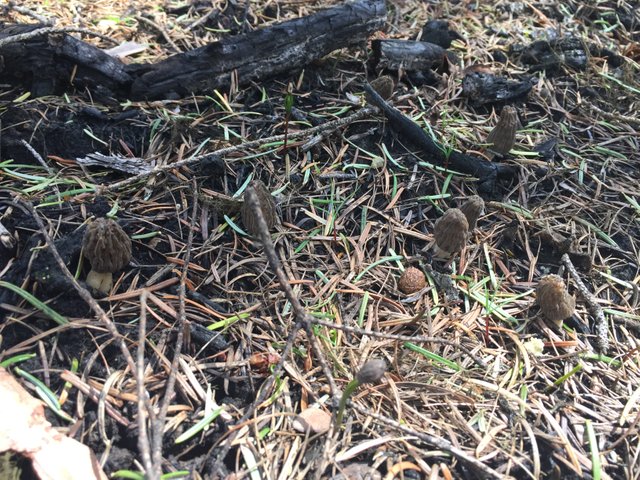
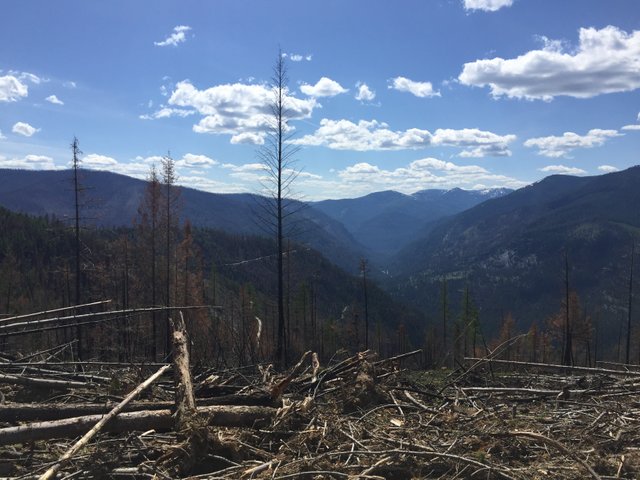
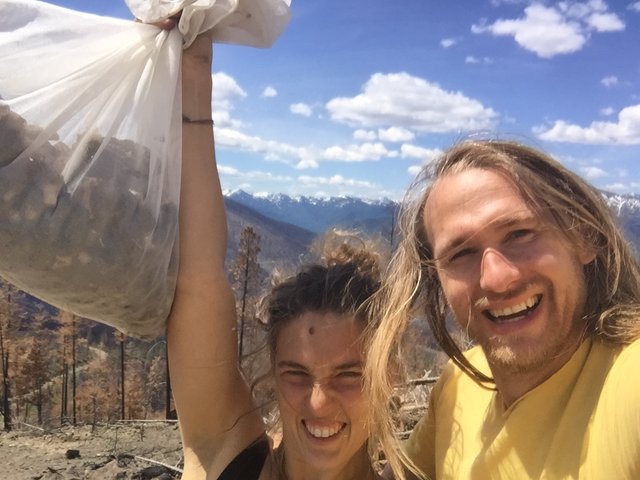
We ended up hiking all over the mountain, with our mesh bag releasing clouds of spores everywhere we hiked! About every 10 to 15 mushrooms I found, I'll take one and pin it up high in a tree branch. I figure that mushrooms expend huge amounts of energy to get their spores to release just a couple inches off the ground, so if I can help them get some more vertical, their spores will travel that much further!
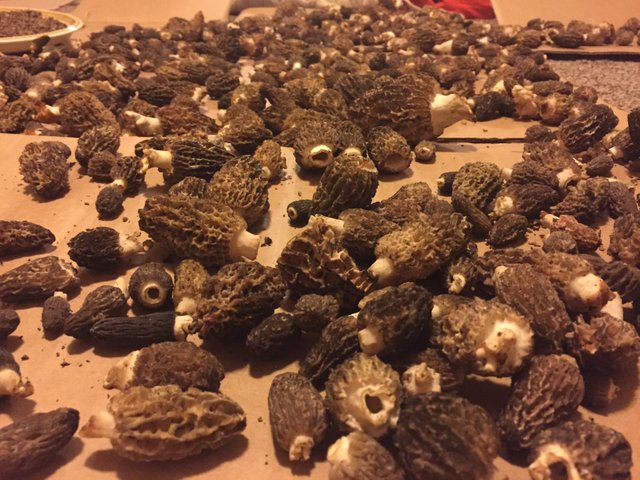
Whats the best way to cook Morels?
A few odds and n ends here. My favorite way to cook Morels is actually a bit counter-intuitive. I think they are substantially better if they're dried first. I let them bone-dry sitting in the sun, or the dash of your car, or inside with a fan over them. When I'm ready to consume them, I soak them in warm water for 15 minutes, then squeeze all the liquid out of them, and toss them in a cast iron with some butter, garlic, pepper, maybe a wee bit of white wine. In this way, they keep their shape, and don't crumble to pieces. Also, the rehydrated morel soaks up whatever yummy fats and seasoning you want to put on it, instead of just being full of water.
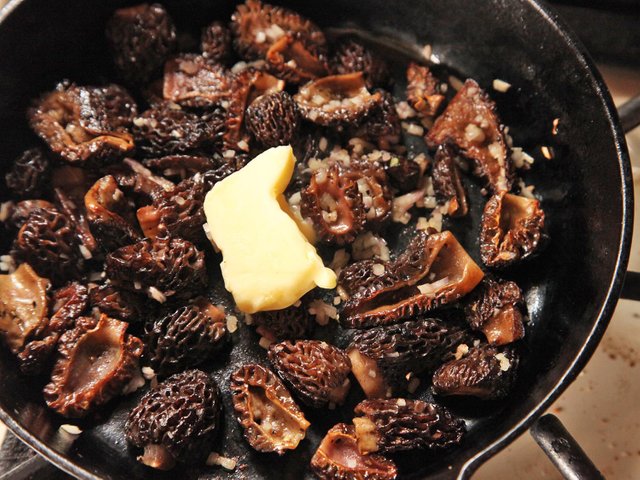
So what do Morels actually taste like? Some people haven't gotten to try them before. I know it's awful, but true. They are only the absolute tastiest mushroom in the whole world, very nutty, deep flavor, and a meaty texture.
Hey have you ever wondered why the symbol for pound is LB? Like what the fuck? I had to look it up this week. Turns out the LB stands for Libra, you know...the scales. And in Latin Libra Pondo was the term for a 'measured pound'...and that shit just stuck around. Yeah, for like 2000 years. We're still using it, and mostly don't even know why. Thats cool. Fucking language.
I actually tried to give myself a mushroom tattoo once with a way too large of needle, and absolutely no idea what I was doing. It didn't turn out like any of these needless to say, instead it looks like I have some sort of disease on my hip whenever I take my pants off :P
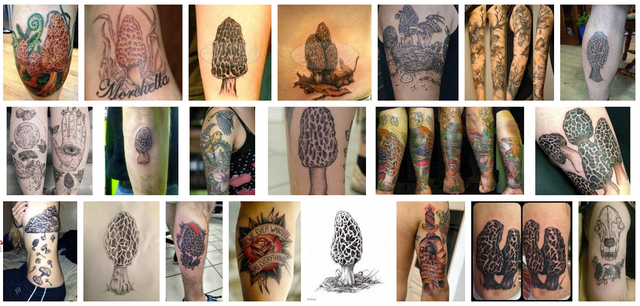
But if mushroom tats aren't your thing, and you're not really into hauling your ass over big burned mountain tops crawling with gun-toting rednecks and aggressively friendly hippies, all is not lost. You could simply kick back and play a friendly game of Morels in the comfort of your own home. All of the adventure and excitement of mushroom hunting without any of the bears, poisonous shrooms, murder, or mosquitos!! I actually came face to face with a grizzly while I was barefoot in the woods a couple days after these photos were taken, but that story will have to wait for another day.
Make sure you can tell the difference. Morels are the easiest of all wild mushrooms to identify. There are only a few dangerous 'false morels'. Luckily, they look REALLY different!
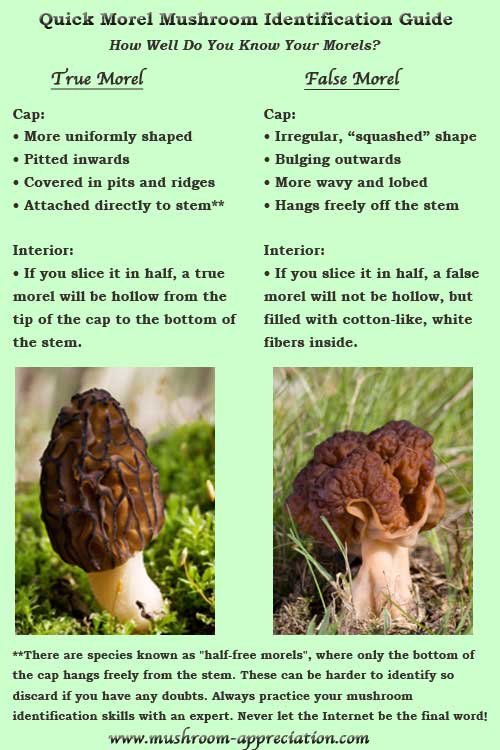
Okay, did you watch the video with the mushrooms infecting insect's brains??? No?!?!?!! Turn around, Go watch that shit!!! It can also be seen on the Jungle Episode of BBC's Planet Earth.
thanks for dropping by, got a story about hitting a good haul??? I bet these guys do
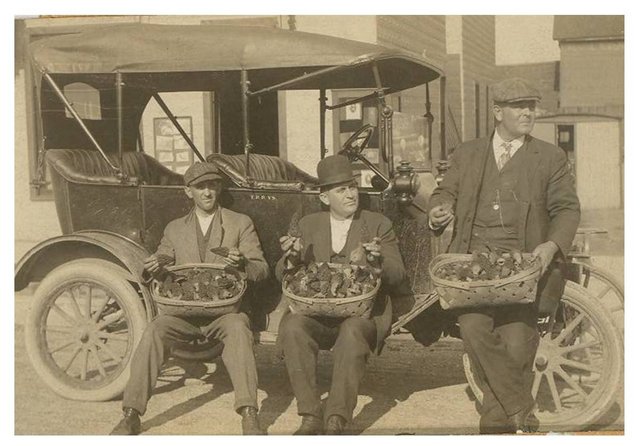
"Animals were something invented by plants to move seeds around"
Outstanding post. Yes it has been an absolutely incredible year for morel hunters here in NW Montana! So glad you two are in on the action and making bank! Thank you for such a fantastic informational teaching article.
Thanks Suzi!!! Yeah, we've been eating Morel Pasta all week...its amazing =) You're up there near Thompson Falls sorta aren't you? I was thinking we should make a group of for Montana Steem somehow...Maybe a chat room? Or a tag...lol it's a little unclear, but SOMETHING!!!
Damn! This is probably the best article I've ever read about Morels. Growing up, my parents would take me Morel hunting around the Bitterroot in places that had recently had forest fires. Last summer, a huge forest fire broke out near my home town, and recently a friend of mine hunted some absolute massive Morels from that site.
did you grow up in Montana cluff? Thanks a bunch!!! I like hearing that =) Yeah some of them get pretty big
Yeah I did! Bitterroot Valley area.
Awesome post! I just planted a garden with 4 different mycorhiza~ products :] and plan on doing some AACT once my worm castings are a bit more aged.
https://steemit.com/gardening/@mrainp420/the-birth-of-a-beautiful-garden-and-some-hot-peppers
thanks cryptohustlin!!! That looks beautiful!! super exciting
Wish I would have seen this post sooner! I have a buddy that hunts morels and his harvest this year was huge. I need to get out and do this some time...maybe this post is my inspiration. Up-voted and followed!
Yeah, it's been crazy this year in NW Montana! Go do it!!!! Those little buggers make me so happy
Great hunt, from a fellow Montanan! Props for sporing as you go, most people don't do that! Can't wait to hear the griz story
Oh Cool, where in Montana are you? I've been outside Helena the last few winters, and think I'm going to be in Missoula for the summer. Nice guitar lesson!!! that stuff is super hard for me, lol, maybe I've never been dedicated enough to keep at it
I live in Missoula. :) I play guitar for the Reverend Slanky Funk/ R & B band
no fucking way!!! I love you guys! god damn lol =) I've had some good nights dancing with yall :P thats bloody awesome Chris
hell yeah boss! glad you dig. Im heading over your direction this afternoon to flyfish the Little Blackfoot. Cheers
Great post dude, just drinking my morning Kefir as I type. Have you looked into the Cordyceps mushrooms at all? pretty mad grow cycle.
hey @perceptualflaws! They're crazy aren't they? I love Cordyceps, freaky freaky stuff =)
Great article!
I have friends that go searching for these mushrooms every year,
and stop by to stay the night with me when they bring them in to sell.
I always get giving a small bag of morels as a gift.
Lucky!!!! thats the way to go =)
Wow!! Great read!!
I thought this was about psilocybin mushrooms lol
you got me!!! that was secret part i left out :P don't want the grand children poking around on mah Steemit account some day...
I was about to comment be careful of "false Morels", but then you covered it right at the end of the post! lol
Great find, they looked delicious! Now that you got me all hungry, I think I'm gonna go serve myself up some Oyster mushrooms! :)